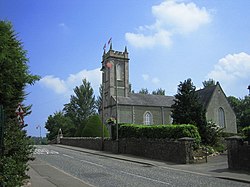Loughgall
| Loughgall | |
| County Armagh | |
|---|---|
 St Luke's Church | |
| Location | |
| Location: | 54°25’0"N, 6°36’-0"W |
| Data | |
| Population: | 282 (2011
os grid ref = H908522) |
| Post town: | Armagh |
| Postcode: | BT61 |
| Dialling code: | 028 |
| Local Government | |
| Council: | Armagh, Banbridge and Craigavon |
| Parliamentary constituency: |
Newry and Armagh |
Loughgall is a small village, townland (of 131 acres) and parish in County Armagh. It is situated in the baronies of Armagh and Oneilland West.[1] It had a population of 282 people (116 households) in the 2011 Census.[2] (2001 Census: 285 people) Its name is from the Irish Loch gCál, meaning "cabbage lake".[3][4]
Loughgall was named after a small nearby loch. The village is at the heart of the apple-growing industry and is surrounded by orchards. Along the village's main street is large set of gates leading to Loughgall Manor. An imposing building, the Manor was once the home of the Cope family who arrived as part of the Plantation of Ulster in the 17th century.
Contents
History
In 1795, rival sectarian gangs, the Catholic Defenders and Protestant Peep-o'-Day Boys fought a bloody skirmish called the Battle of the Diamond, that left around 80 people dead. The Orange Order was founded in Dan Winter's House, Loughgall following these events.
Places of interest
Loughgall Country Park is set in a 188 hectare estate of open farmland & orchards and includes an 18 hole golf course and 37-acre coarse fishery.
The NI Horticulture and Plant Breeding Station is set in the Loughgall Manor Estate, surrounded by mature woodlands and overlooking the Lough Gall. The estate was established in the late 17th century by Sir Anthony Cope of Hanwell, Oxfordshire and became the Cope family home for 350 years. In 1947 the estate was purchased from Field Marshal Sir Gerald Templer, a descendant of the original owner, by the (then) Ministry of Agriculture.
Sport
It is home to Loughgall Football Club, which plays in the IFA Championship.
People
- W. R. Rodgers (1909 – 1969), probably best known as a poet, was ordained as a Presbyterian minister in 1935 and was first appointed to Loughgall Presbyterian Church, Loughgall, where he was minister for 12 years. (Loughgall Presbyterian Church is in the townland of Cloveneden) He later gave up the ministry and became a BBC radio producer and scriptwriter. He died in California in 1969 and was buried in Loughgall.[5]
Parish of Loughgall
The parish contains the villages of Annaghmore, Charlemont and Loughgall.[1]
Townlands
The civil parish contains the following townlands:[1]
- Aghinlig
- Altaturk
- Annaghmacmanus
- Annaghmore
- Annasamry
- Ardress East
- Ardress West
- Ballygasey
- Ballymagerny
- Ballytyrone
- Borough of Charlemont
- Causanagh
- Charlemont, Borough of
- Clonmain
- Cloven Eden
- Coragh
- Corr and Dunavally
- Derrycoose
- Derrycrew
- Drumart
- Drumharriff
- Drumilly
- Drumnasoo
- Dunavally and Corr
- Eagralougher
- Fernagreevagh
- Keenaghan
- Kinnegoe
- Kishaboy
- Legavilly
- Levalleglish
- Lislasly
- Lisneany
- Lissheffield
- Loughgall
- Mullaghbane
- Mullaghmore
- Mullanasilla
- Rathdrumgran
- Tirmacrannon
- Turcarra
References
- ↑ 1.0 1.1 1.2 "Loughgall". http://www.thecore.com/seanruad/. Retrieved 13 May 2015.
- ↑ "Loughgall". NI Statistics and Research Agency. http://www.nisra.gov.uk/census/2011/results/settlements.html. Retrieved 22 April 2015.
- ↑ Placenames NI
- ↑ Placenames Database of Ireland
- ↑ "Introduction - WR Rodgers Papers". Public Record Office of Northern Ireland. http://www.proni.gov.uk/introduction__rodgers_papers_d2833.pdf. Retrieved 4 March 2009.
- Discover Northern Ireland
- NI Horticulture & Plant Breeding Station
- NI Conflict Archive on the Internet
- Culture Northern Ireland
Outside links
| ("Wikimedia Commons" has material about Loughgall) |